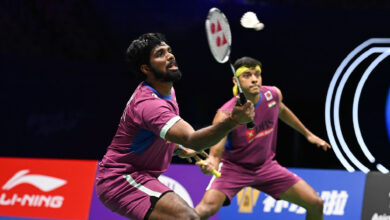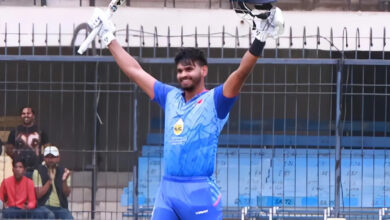Gukesh, The Boy Who Went Past Viswanathan Anand

Last week, when 17-year-old D Gukesh surpassed Viswanathan Anand to become the top-ranked Indian chess player in live ratings, it came as a surprise to no one who follows the game of 64 squares. After all, Anand — a five-time world champion and India’s first grandmaster — has eased off on his competitions in recent years, while his successor has been playing tournaments at a breakneck pace.And yet, when it happened, it felt like a new era in Indian chess had begun.Gukesh’s rise in live ratings — which are updated in real-time — will foreshadow his ascent to being the top-ranked Indian chess player at the end of this month when the International Chess Federation (FIDE) publishes its world rankings. When that happens, it will be the first time in 36 years that an Indian player will surge ahead of Anand in the published rankings. Pentala Harikrishna had briefly overhauled Anand in live ratings in 2016, but no Indian came close to threatening Anand in the published rankings since the late 1980s.
D Gukesh plays Viswanathan Anand, a five-time world champion and India’s first grandmaster, in July 2023 at the Zagreb SuperUnited Rapid and Blitz event. (FIDE/Lennart Ootes)
“A player like Gukesh, who has broken into the world’s elite at an early age, is going to be the trend rather than the exception. I think India has a lot to look forward to,” Magnus Carlsen said during the Global Chess League recently.
Not a man who is easily impressed, the world no 1 from Norway almost enviously gushed when asked about India’s riches in chess. “It’s awesome to see the huge amounts of young Indian players that are taking over the chess scene. India is producing GMs at a higher level than ever before. I think we’re just at the beginning of a chess revolution,” said the former world champion, doffing his hat to Gukesh and other teenage prodigies from India like Praggnanandhaa R (17 years old), Nihal Sarin (19) and Arjun Erigaisi (19).
The rise of Gukesh
For Gukesh, the rise to the mountaintop of Indian chess has been quick. But it has not been easy, requiring sacrifices from his entire family. As Gukesh’s interest in chess morphed into obsession, other bits of his life were left behind.
Ask his childhood coaches what things interest Gukesh besides the chess board, and one of them says, “Only chess. Nothing else.”
Ask Gukesh’s current trainer, GM Vishnu Prasanna, about his friends, and he points out that the teenager doesn’t spend too much time in Chennai. “It’s always like that for chess players. They live in a different world. It’s slightly difficult for other people to relate with you,” Vishnu says.
He does share a kind of kinship — Gukesh prefers the term ‘frenemies’ — with the other Indian prodigies like Praggnanandhaa, Nihal and Arjun, who are travellers down the same path. The teenagers come together for rounds of Moroccan bluff on the last days of tournaments when they can.
Gukesh has recently picked up a liking for sports books, devouring Abhinav Bindra’s A Shot At Hory and biographies of athletes like Rafael Nadal and Kobe Bryant.
“But his whole day revolves around chess. He trains for about seven-eight hours. But on most days it’s more than that,” says Vishnu, who points out that even things he does away from the board — like morning yoga and evening gym sessions — are geared towards making him a better player.
“The boy has a very good appetite for chess. He’s definitely an obsessive guy. His parents and I sometimes urge him to do things outside of the sport. He doesn’t take a break from chess. Someone has to push him to do it,” says Vishnu, who occasionally whisks him away from Chennai for leisure activities like going to a climbing gym.
That single-minded focus towards rising to the top is also apparent from his major life decisions. Gukesh hasn’t been to school since class 4. For a conservative South Indian family, the decision was initially hard to reconcile with.
“Since he has given up on his academics, and has taken chess as a profession, he has to go to the top to prove himself. We don’t pressurise him to play chess. This is something that he wants to do,” Gukesh’s mother Padma told The Indian Express.
Her voice gives away the natural reservation that any middle-class South Indian parent would have in letting their kid forgo the safety net of basic education. “After a long struggle and a lot of discussion, we decided this. Even now, while his father is okay with the decision, I feel he should at least complete his basic studies. But since he doesn’t even have time to touch a schoolbook, I cannot expect him to continue with his studies.”
Gukesh’s father Dr Rajini Kanth had to stop his lucrative practice as an ENT doctor about five years back to be a constant companion to his teenage son.
“Usually his father travels with him to all events. I get to meet him very few times in the whole year. We’re in the same city for maybe three months of the year. Every month, for one week or 10 days, he’s home,”says Padma, a Chennai-based microbiolog, adding, “But it’s fine. We think he has to play a lot in his younger days.”
The cost of hectic travels from one tournament to another is eye-wateringly steep. There are tales of Dr Rajini Kanth selling off property to fund his son’s ambitions. His doctor friends also raised money crowdfunding. The father-son duo cut costs spending nights at airport lounges.
“I don’t think Gukesh is too bothered about all the hectic travel. I think his father was suffering a little more (from sleeping at airports). Gukesh was just 12 or 13. All he wanted to do was play chess. I know they’ve spent nights at airports. But you don’t mind it when you’re 13,” says Vishnu.
“Dr Rajini Kanth is the real hero of Gukesh’s story. He’s sailed through financial difficulties. Just going for one tour of Europe for a tournament means spending anywhere over Rs 2 or 3 lakh. At that stage, there were no sponsors. So he’s had to sell property. Without Dr Rajini Kanth, this story doesn’t work,” adds Vijayanand, Gukesh’s second coach.
The pandemic years
In the years before the pandemic, as Gukesh obsessively chased the title of the world’s youngest grandmaster — he missed 17 days, but did set the record as India’s youngest GM — he played 230 games a year. He was also an outlier in a sport when kids start working with chess engines as early as seven or eight years of age. He started working with engines only when the pandemic halted over the board chess events. At that time, he was already rated over 2,500.
While the pandemic period was frustrating, Gukesh capitalised on this phase to rise rapidly. As Vishnu points out, unlike other prodigies, he does not like to play on chess portals for leisure. He’s also a rare example of a player who likes an over-the-board combat and the slow burn of classical chess.
One of the defining interventions in Gukesh’s career came from his idol Anand, who started the Westbridge Anand Chess Academy (WACA) in 2021. Gukesh was among the hand-picked Indian GMs at WACA, who learnt the nuances under five mentors: Poland’s Grzegorz Gajewski (for opening theories), GM Sandipan Chanda (for mid-game prep), Russian GM Artur Yusupov (for endgame prep), and Boris Gelfand, besides Anand himself.
The making of Gukesh
Gukesh grew up in a family where chess was a recreational pursuit. Padma, recollects the “time-pass” chess games in their joint family, where the 7-year-old Gukesh first caught the bug.
“He learnt how the pieces move and started playing attacking chess. So we thought this was a sign of his natural talent,” says Padma
At Velammal School in Chennai, Gukesh was still in class 1 when a chess coach, Bhaskar V, caught a glimpse of his talent in the extracurricular activities (ECA) period. It was Bhaskar who told Gukesh’s parents that the boy was meant for greater things. “Bhaskar sir told us that Gukesh should not be in school. His level is totally different,” recalls Padma.
Bhaskar, who was Gukesh’s first coach, paints a portrait of a boy who was committed to any task set for him in a sea of restless, fidgety children.
“We’d give the kids chess positions to solve in class. Until he found the solution, he would not get up from his seat,” says Bhaskar, who then introduced Gukesh to Vijayanand, at whose academy Bhaskar was a coach.
At the Vijayanand Chess Academy, Gukesh’s days started early, at 9.30 am and went on till 7.30 pm. (Special Arrangement)
Gukesh soon swapped the tedium of school with six-days-a-week of vigorous chess, where the levers in his brain were always whirring. At the Vijayanand Chess Academy, Gukesh’s days started early, at 9.30 am. After some quick yoga to warm up, Gukesh and the other kids would be raised on a staple diet of 70 chess puzzles a day to help them strengthen their tactical and positional awareness.
Once that was done, he would be taught chess theory and middle-game strategy. Classes would go on till 7.30 pm. He would then wait for his father to shutter his ENT clinic and pick him up.
Even when he played tournaments, Vijayanand said Gukesh loved solving chess puzzles for an hour on competition days. His in-tournament routine involved solving 25 puzzles per day, an hour or so of puzzle-solving.
D Gukesh with Vijayanand, his second coach and owner of Vijayanand Chess Academy in Chennai. (Special arrangement)
Just like Bhaskar before him, Vijayanand pushed Gukesh ahead letting go at the right time, rather than clinging on to what they knew was a generational talent. “Until (the rating of) 2,300 was my ability as a coach. But after that, I don’t want to waste the kid’s time and their career,” says Vijayanand.
Despite all the success, his early coaches say Gukesh is still the same. Vijayanand speaks of messages Gukesh sent him, thanking him for his role after his recent successes. Bhaskar was a live games in-charge at last year’s Olympiad in Chennai. Gukesh would come around to merrily chat chess with Bhaskar after rounds.
“He was the same person I had first seen 10 years back in school,” says Bhaskar. “Besides his age and ratings, nothing had changed.”







